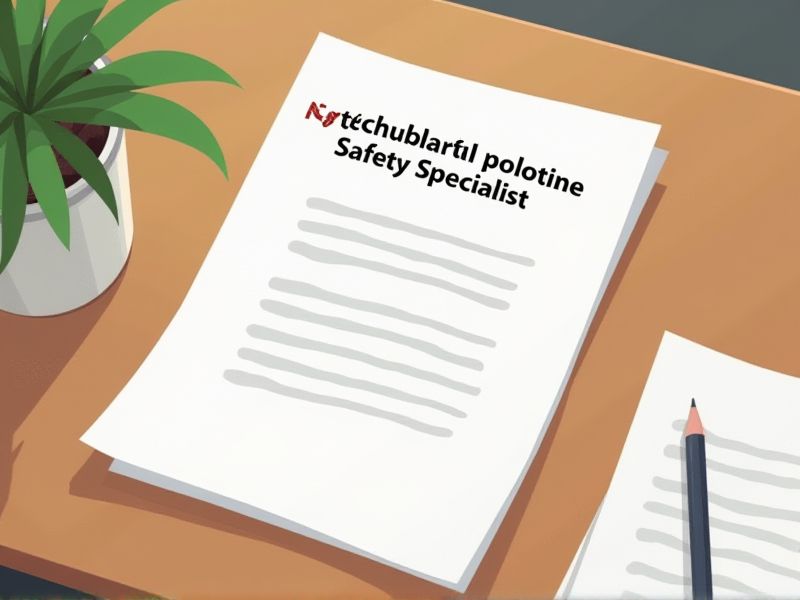
The role of an Agricultural Safety Specialist is crucial in minimizing risks and ensuring compliance with safety regulations in agricultural settings. Specific certifications provide expertise in hazard identification, risk assessment, and implementation of safety protocols. Certification also validates a specialist's ability to train workers and manage safety programs effectively. Here are some important certifications required for Agricultural Safety Specialists.
OSHA 10-Hour General Industry Safety Certification
The OSHA 10-Hour General Industry Safety Certification is essential for Agricultural Safety Specialists as it provides comprehensive knowledge of workplace safety standards applicable to various industries, including agriculture. Holding this certification ensures that specialists are equipped to identify potential hazards and implement effective solutions, directly reducing the risk of accidents on farms. It also demonstrates a commitment to maintaining a safe working environment, which can lead to improved worker morale and productivity. Consequently, the certification can help organizations avoid costly fines and enhance compliance with federal safety regulations.
OSHA 30-Hour General Industry Safety Certification
The OSHA 30-Hour General Industry Safety Certification equips an Agricultural Safety Specialist with comprehensive knowledge of workplace safety standards, reducing the incidence of farm-related accidents. Familiarity with safety protocols fosters a safer working environment, which can enhance productivity and morale in the agricultural sector. By understanding the regulatory guidelines, specialists can ensure compliance with safety laws, thus reducing legal liabilities for farm operations. Adequate safety training helps in identifying potential hazards early, preventing costly disruptions and ensuring the well-being of agricultural workers.
Certified Safety Professional (CSP)
Agricultural environments often involve hazardous machinery and chemicals, so a Certified Safety Professional (CSP) brings expertise to develop safer workflows. The CSP designation ensures an Agricultural Safety Specialist has met rigorous standards, which can lead to fewer workplace accidents. Employers and stakeholders often trust CSP-certified experts to enforce compliance with complex safety regulations. The specialized knowledge and credibility that come with CSP certification enhance the ability to implement effective safety protocols in agricultural settings.
HAZWOPER Certification
HAZWOPER Certification equips Agricultural Safety Specialists with the necessary knowledge to handle hazardous substances often found in agricultural settings, such as pesticides and fertilizers. This training ensures specialists can effectively implement safety protocols, reducing the risk of contamination and exposure. Certification aligns with OSHA regulations, which require professionals to be trained in managing and responding to hazardous waste operations. Having this certification improves the credibility and trustworthiness of safety specialists in safeguarding both workers and the environment.
First Aid/CPR Certification
Agricultural Safety Specialists often work in remote areas, where immediate medical assistance may not be readily available, making First Aid/CPR certification essential. Frequent use of heavy machinery and tools in agriculture increases the risk of accidents, necessitating quick response capabilities. Pesticide exposure and other chemical hazards pose potential health threats, reinforcing the need for emergency medical preparedness. Certification ensures that specialists can provide life-saving interventions during crises, safeguarding workers' well-being on the farm.
EPA Pesticide Applicator Certification
The EPA Pesticide Applicator Certification ensures that Agricultural Safety Specialists possess the necessary knowledge to handle and apply pesticides safely, reducing the risk of contamination to the environment and food supply. Proper certification helps in minimizing health risks to farm workers and communities by ensuring adherence to safety standards and regulations. Knowledge gained from the certification process enables these specialists to implement effective pest management strategies, decreasing potential crop loss. Compliance with certification requirements is also crucial for meeting legal standards, protecting agricultural businesses from potential liabilities.
Confined Space Entry Certification
Confined space entry certification equips agricultural safety specialists with the skills to recognize and evaluate hazards in restricted environments like grain bins and silos. Lack of adequate safety training increases the risks of entrapment and exposure to toxic atmospheres, posing significant threats to farm workers. Certification programs impart essential rescue techniques, enabling timely interventions during emergencies. Ensuring specialists are certified reduces workplace accidents and reinforces compliance with agricultural safety regulations.
Lockout/Tagout Training Certification
Agricultural Safety Specialists need Lockout/Tagout Training Certification to prevent machinery-related injuries by ensuring proper de-energization during maintenance. The certification equips specialists with the knowledge to identify and control hazardous energy sources, reducing risk of incidents. Proper training helps in compliance with Occupational Safety and Health Administration (OSHA) regulations, protecting workers and organizations from legal liabilities. Acquiring this certification enhances the specialist's credibility and effectiveness in promoting a safer work environment.
Emergency Response and Preparedness Certification
Agricultural environments often present unique hazards, including exposure to harmful chemicals and machinery, necessitating specialized knowledge for effective emergency management. Certification in Emergency Response and Preparedness equips Agricultural Safety Specialists with the skills to swiftly address and mitigate accidents, reducing the potential for severe injuries or fatalities. The training enables these specialists to develop and implement strategic safety plans tailored to prevent disasters specific to farm and ranch operations. Heightened preparedness fosters a safer working environment, subsequently decreasing operational disruptions and enhancing overall productivity in the agricultural sector.
NFPA 70E Electrical Safety Certification
The NFPA 70E Electrical Safety Certification equips an Agricultural Safety Specialist with essential knowledge to recognize electrical hazards, ultimately reducing workplace injuries and fatalities. Agriculture often involves the operation of heavy machinery and complex electrical systems, requiring specialists to ensure equipment and processes adhere to safety standards. Certification demonstrates due diligence and competence in maintaining safety compliance, which is crucial for preventing costly accidents and legal liabilities. By understanding NFPA 70E guidelines, specialists can implement effective safety protocols, promoting a culture of safety and enhancing overall operational efficiency.
Summary
With certifications, you can expect enhanced knowledge and expertise in agricultural safety protocols. This leads to improved hazard identification and mitigation strategies, reducing workplace accidents. Your credibility and career advancement opportunities within the agricultural industry will likely increase. The overall safety and productivity in farming operations should see a notable improvement.
